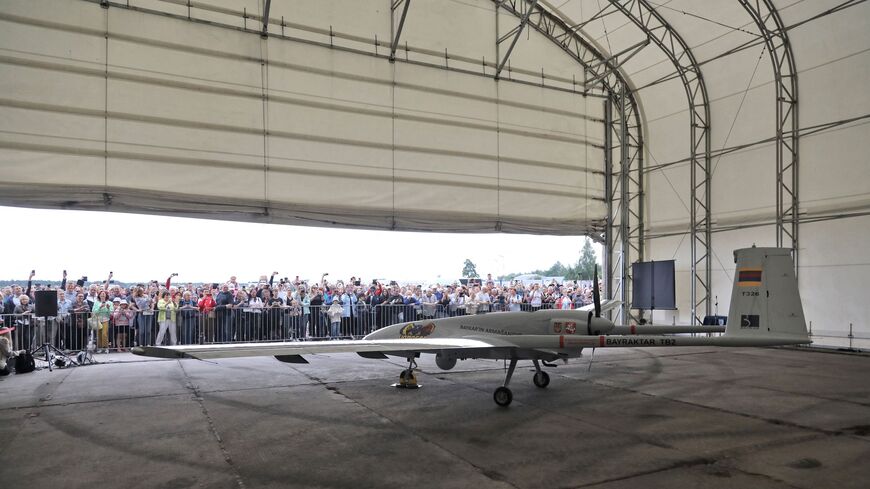IZMIR, Turkey — Turkish President Recep Tayyip Erdogan said Tuesday that Turkey expected to reach $6 billion in arms sales in 2023, hoping for a nearly 36.3% rise from last year’s $4.4 billion.
“We have already achieved a record export level of $2.3 billion in the first half of the year,” Erdogan said in a video message to the International Defense Industry Fair 2023 (IDEF’23), held in Istanbul between July 25-28.
The Turkish defense and aeronautics sector’s export revenues passed the $4 billion mark in 2022, up from $3.2 billion in 2021. The sharp defense export rise is attributed mainly to aerospace and the country’s popular drones used by more than 30 countries.
Turkey's leading exporter of armed drones, Baykar Technology, clinched two billion-dollar contracts with Saudi Arabia's Defense Ministry to transfer technology and jointly produce its advanced Akinci drones. Haluk Bayraktar, the chairman of Baykar and an avid Erdogan supporter, said the deal had been in the works for a year. Though Bayraktar called the agreement “the largest one ever made by a Turkish firm,” he kept mum about its details, timing and exact amount, keeping defense analysts hedging bets between $1.5 and $5 billion.
Finally ending the suspense today, Haluk Gorgun, the newly appointed chairman of Turkey’s Defense Industries, told CNN-TURK that the most significant export deal ever made in Turkey — meaning Baykar’s Akinci deal — was worth more than $3.1 billion without elaborating further.
While Saudi Arabia has opted for the high-altitude long-endurance Akinci (“raider”) drones, many countries went for the smaller and less expensive Bayraktar TB2s, used by Ukraine in fighting the Russian invasion and by Azerbaijan in reconquering territory around the Nagorno-Karabakh enclave occupied by Armenia in the first war in the 1990s. Inspiring songs and pet names, Bayraktars have since been on the wish list of many countries including NAT0 members Poland and Romania, Qatar and several African nations such as Nigeria and Niger.
A drone for all missions
“While Bayraktar is surely the best-known Turkish drone, there are many different UAVs suitable for different missions produced by Turkish public or private companies. They are either exported or co-produced with allies worldwide,” Ozgur Eksi, editor-in-chief of online defense portal TurDef.co, told Al-Monitor. “Kyrgyzstan, for example, bought Bayraktar TB2 drones in 2021. Kazakhstan, the regional powerhouse, opted for the co-producing Anka, a medium-altitude long-endurance unmanned aerial vehicle suitable for reconnaissance missions, produced by Turkish Aerospace Industries (TUSAS). Way before the Turco-Suudi deal on the Akinci drones, two Saudi Arabian manufacturers started co-producing a Karayel-SU, Turkish-made medium-altitude, long-endurance drones, under license from a Turkish defense company Vestel Savunma.”
At IDEF’23, Erdogan described Turkey as “one of the top three countries on drone technology” and “one of the 10 countries that make its own warships.”
"We are pleased to present our knowledge and experience in the defense industry to the benefit of our friends," the Turkish president added, referring primarily to the Gulf countries last week. “I am convinced we will sign more deals during the fair, too,” he said.
“Turkey’s developing defense industry draws an ever-increasing number of companies to IDEF,” Gorgun, the newish chief of the Defense Industries in Turkey, told CNN-TURK at the fair's opening. “We have more than 81 countries participating this year, 5,000 scheduled meetings and 120 deals in the pipeline which we hope will be signed during the fair.”
Half a dozen American companies, including Lockheed Martin, the producer of F-16 Fighting Falcons, are at the IDEF, which is held every other year. So is the United Arab Emirates, with which Erdogan inked a new space and defense development deal last week. More than 70 Chinese companies, mostly dealing with defense and information technologies and logistics, are also at the fair. Many aim to buy Turkish companies suitable for their longer-term targets, according to US-based Defense News.
Erdogan said that Turkey was implementing 850 different projects in the defense sector, a reference to several new weapons Turkey is displaying for the first time during IDEF’23. State-run Aselsan will debut its mobile laser weapons system and a new air defense missile system designed to counter the threats of armed and unmanned aerial vehicles, warplanes and helicopters, anti-ship missiles and cruise missiles.
Just makes us stronger
The Turkish president also attacked “international embargoes and arms restrictions” on Turkey. “Despite open or veiled embargoes that we face, Turkey continues to work determinedly in developing its defense industry,” he said.
Erdogan uses lifting embargoes and restrictions on arms sales to Turkey as leverage to greenlight Sweden’s membership in NATO — a sticky point looming over Ankara’s allies in the military alliance. Sweden and Finland said they have no embargo against Turkey, but Erdogan wants other NATO allies — particularly the United States, Canada and the Netherlands — to lift restrictions.
The United States administration says that it supports the sale of F-16s and modernization kits to Turkey but needs buy-in from the top Democrats and Republicans on the House Foreign Affairs and Senate Foreign Relations committees, which have the power to block it.
Erdogan met with Canadian Prime Minister Justin Trudeau during NATO’s Vilnius Summit and reportedly brought up the issue. Canadian news outlets have reported that Ottowa may loosen its arms export restrictions against Turkey as that country moves to strengthen ties with its Western peers.
The Canadian government hasn’t confirmed the reports. “The export controls for Turkey were imposed for important reasons. These controls currently remain in place,” Alison Murphy, press secretary for the Prime Minister’s Office, said in a statement following the summit.
“Canada remains committed to the principle that there should be no restrictions, barriers or sanctions to defense trade and investments among allies,” she added.
The Netherlands announced earlier this month that it was lifting its embargoes against Turkey, put in place in 2019 after Turkey’s military incursion into Syria.








